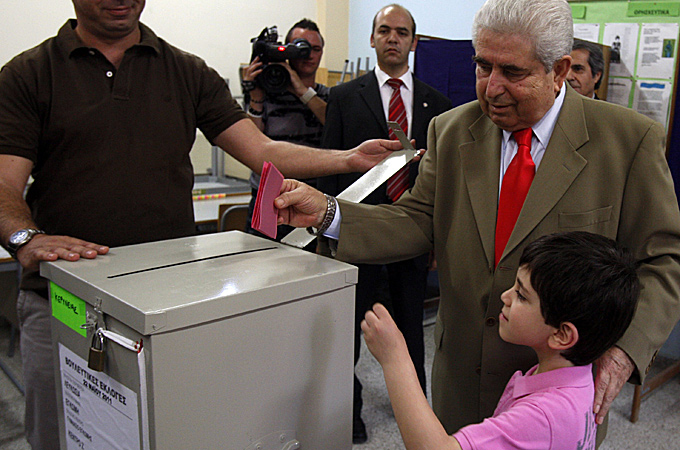Right-wing opposition wins Cyprus election
Result dents re-election chances of Demetris Christofias, the communist president, who is handling reunification talks.

 |
| Christofias has been criticised for proposing the island’s two communities share a rotating presidency [Reuters] |
The right-wing opposition has won parliamentary polls in Cyprus, denting the re-election chances of Demetris Christofias, the communist president, who is handling complex reunification talks with Turkish Cypriots.
Official results on Sunday placed the opposition Democratic Rally in first place with 34.27 per cent of the vote.
Communist AKEL, the principal backer of Christofias, came in second place with 32.67 per cent.
Analysts believe gains by the opposition in parliament could put Christofias under greater pressure to retract concessions made to Turkish Cypriots in talks which have made little headway since their launch in 2008.
“It could actually go two ways. He could decide to push for a breakthrough now, or decide to go more hardline to win back votes,” said Hubert Faustmann, a political analyst.
Both AKEL and the Rally party made gains compared with the 2006 elections, though the spotlight was on defections from the junior governing coalition partner, the Democratic Party, suggesting it bore the brunt of its association with AKEL.
Democratic Party officials interpreted the result as discontent with Christofias’ tactics in reunification talks.
Cyprus was split in a Turkish invasion in 1974 following a brief Greek-inspired coup, with its Turkish Cypriots living in the north and Greek Cypriots, who represent Cyprus in the EU, in the south.
Rotating presidency
Christofias is engaged in peace talks with Dervis Eroglu, his Turkish Cypriot counterpart, on finding a federal settlement to the conflict that is complicating Turkey’s bid to join the EU.
The UN has said it hopes for a deal by mid-2012, with both sides needing to speed up talks by then.
Christofias has been criticised for proposing the island’s two communities share a rotating presidency under a weighted voting system.
The Democratic Rally, previously seen as moderate, has become slightly more hardline in recent months.
The leftist coalition has also been criticised for slow economic growth and rising unemployment.
Voting is compulsory in Cyprus, but the abstention rate was at a record high of 21 per cent.
Although in government, the junior Democratic Party has been one of Christofias’s biggest critics, mainly on his perceived inaction to shore up the economy and his rotating presidency proposal.
“There has been a political cost due to the tolerance that the Democratic Party has shown [to the government] on tactics that it disagreed with,” said Nicholas Papadopoulos, Democratic Party vice chairman.
Christofias has not said whether he plans to seek a second term at the presidency in 2013, but the Democratic Party defeat in the election is likely to prompt the party to reconsider who to support.
“This would be a boost for the presidential chances of the Democratic Rally and a setback for the prospects of the ruling coalition to win the presidential election in 2013,” Faustmann said.
Cypriot elections typically produce a hung parliament with no party gaining an absolute majority in the 56 member House of Representatives.
Consensus-building and alliances are an integral part of Cypriot politics.